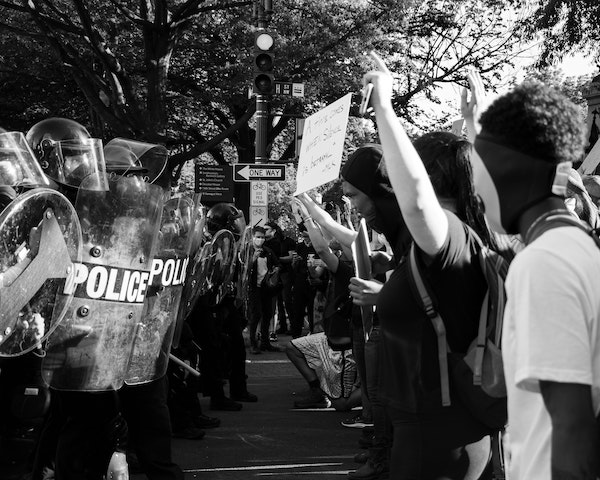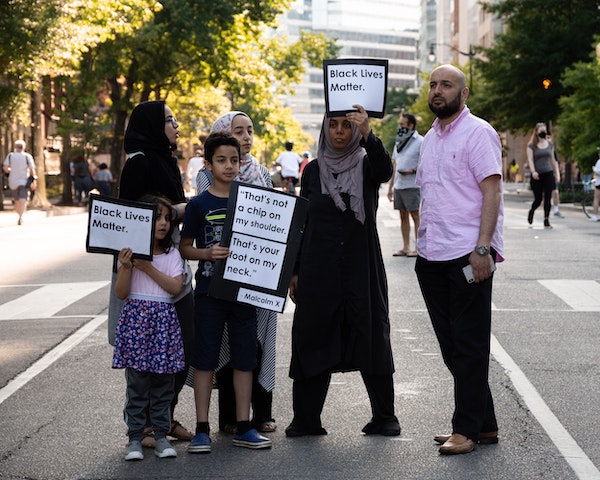By Julia Reticker-Flynn, Program Officer, Piper Fund, Right to Protest
We are in a defining moment for the right to protest in this country. Over the past few months, historic protests for racial justice have swept the nation, healthcare professionals have taken to the streets demanding PPE, and people have clamored for a stronger response to the COVID pandemic. Researchers estimate that between 15 and 26 million people have participated in protests for racial justice in the wake of George Floyd’s murder—making it the largest protest movement in American history.
In response, police have teargassed U.S. residents in over 100 cities; shot rubber munitions into crowds, blinding and maiming protesters; and utilized batons and riot gear completely inappropriately and needlessly to intimidate and quash dissent. Federal agents have teargassed and forcibly removed peaceful protesters for a political photo opportunity in Washington, kidnapped protesters in Portland in unmarked vehicles, and entered several cities against the will of local officials.

This overwhelmingly harsh and militarized response to silence dissent, particularly of communities of color, is not new. Many of us can recall watching military tanks roll through the streets of Ferguson after the murder of Mike Brown and police blasting water cannons at protesters at Standing Rock. From indigenous protests at pipelines to Black Lives Matter protests, efforts to quell demonstrations are, at their core, an attempt to suppress voices of black, brown, and indigenous communities.
Over the upcoming months, as people take to the streets again in large numbers to protect our democracy and further advance racial justice, Piper and our partners are extremely concerned about the legislative and likely militarized response to quash these demonstrations.
In the wake of historic protests, some legislators are working quickly to quash dissent and criminalize protest rather than heed the calls for racial justice. Just last month, legislators in Virginia introduced six anti-protest bills. Tennessee enacted a law that will increase penalties for blocking a street or sidewalk, interfering with a legislative meeting, or “inciting a riot.” The law also makes it a felony to camp on state grounds, punishable with up to 6 years in prison; thanks to Tennessee’s felony disenfranchisement law, those convicted of such “crimes” would also forfeit their right to vote. This legislation was in direct response to advocates who had been camping outside the capitol for 61 days to demand a meeting with the Governor to discuss police brutality and racial injustice. Similarly, the Governors of Florida and Texas both called for harsher penalties for protesters in light of recent racial justice protests. We expect to see a continued uptick in bills, particularly overly broad anti-riot bills, aimed at criminalizing the freedom of assembly in response to historic protests.
This moment also presents a unique opportunity to advance proactive legislation that would preserve the right to protest, as many have borne witness to the violent tactics used against protesters. Legislators and advocates are considering bills ranging from banning less lethal weapons, to restricting the transfer of military equipment to local law enforcement, to requiring officer identification. Advocates and legislators have an opportunity to work together at the state level to advance reforms to keep protesters safe and to protect the freedom of assembly.
To address these threats and opportunities, Piper convenes bi-weekly strategy meetings with experts in the field, actively tracks new legislation, provides rapid-response grants to state organizations leading proactive and defensive efforts around the right to protest, and supports communications efforts and policy analysis to equip state organizations with the tools to protect the right to protest in their community.
As the general election approaches, the democracy field is preparing for multiple scenarios, including a lack of clarity about the outcome that could last for weeks, a robust effort to undermine the legitimacy of the election, and rampant voter suppression. One thing is clear: In almost every scenario, we expect mass protests led by both conservatives and progressives alike. We expect to see federal agents across the country employ similar tactics to those used in Portland, and we anticipate violent policing by some local jurisdictions. And, as we’ve seen in recent days, we are concerned about militia taking to streets, brandishing weapons, and threatening the safety of protesters.
Over the past few months, Piper has been convening experts in the field to anticipate threats to protest during this potentially volatile time and to develop strategies in response. We are working with partners to create and disseminate resources to help organizers keep each other safe, and we are identifying state organizations to provide rapid-response grants to protect the right to protest.

We are also working with communications experts to develop compelling messages that help the field uplift the right to protest as a core tenant of democracy. Based on messaging research and a media audit conducted by ReThink Media, we’re working with a consultant to hone talking points to protect protest rights during this volatile period, and we’ll be disseminating guidance to the democracy field as a whole. We are also working to present findings to editorial boards and media creators themselves—because, as we saw this summer, despite research indicating that 93% of protests for Black Lives Matter were peaceful, the media coverage disproportionately uplifted instances of property damage and looting, negatively shaping public opinion. We are actively raising funds to expand rapid-response capacity for this period, including a communications expert that can be on call for state and national groups.
As this year has demonstrated, protest is more important to democracy than ever before. Americans have come together and sparked national conversations and actions around racial justice and police brutality, demanded bold action to address climate change, protected key services like the Postal Service, and fought to ensure every vote is counted this election season. When our institutions fail to uphold core values of justice, equality, and fairness, protest is an effective tool to demand accountability and action, and ensure we build a democracy that is responsive to the needs of the people. When those in power seek to end dissent by criminalizing protests, unleashing militarized tactics on peaceful demonstrations, and using dehumanizing rhetoric to describe protesters, our very democracy is threatened.
We know that the threats are enormous, and we can only meet these challenges by working with a robust field of people from every sector. If you are interested in partnering with us on this work, please reach out to Julia Reticker-Flynn, Program Officer for the Right to Protest at jretickerflynn@proteusfund.org.